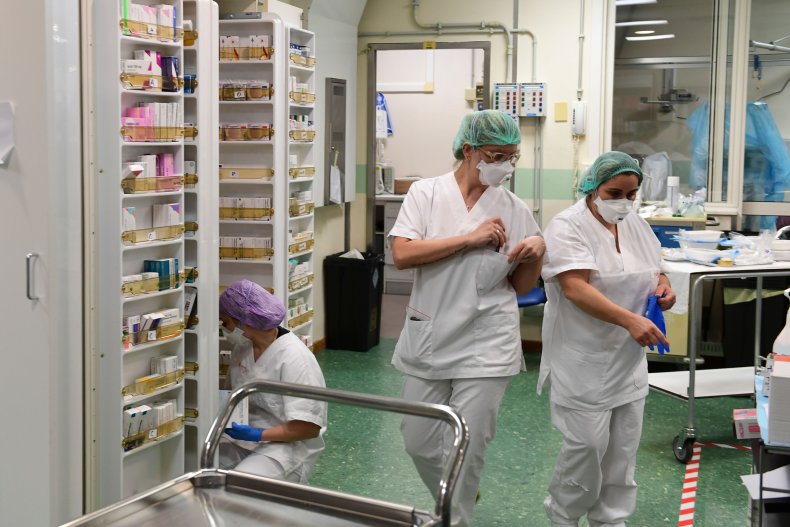A 23-year-old in Italy being treated for the disease caused by the novel coronavirus continues to test positive, despite two months of quarantine and continual swabs.
Bianca Dobroiu arrived at the Sant’Orsola-Malpighi Polyclinic hospital, a public hospital part of the University of Bologna healthcare system, on February 28. She was admitted to the hospital with a fever above 105 degrees and was diagnosed with COVID-19.
“After four days she was fine, but the swabs are still positive,” infectious disease specialist Luciano Attard told local media. “As far as we know, no one else in Italy has remained positive for so long. Usually, positivity results do not last for more than four weeks.” Dobroiu “had not been subjected to any therapy,” Attard said.
Dobroiu was discharged from the hospital on March 6 and returned home where she remained in quarantine under the country’s nationwide lockdown.
“After 57 days, here is the new result,” Dobroiu, who lives, works, and studies in Bologna, wrote on Facebook. “Well, it’s not new because it has never changed. … Nothing is changing at all and it scares me a little today.”
Being asymptomatic, she still tests positive and told local media she was thankful the disease has not progressed. “But doctors have told me that I am still a carrier of the virus and contagious,” she said.
As the European nation, one of the block members most devastated by the coronavirus, seeks to lift its lockdown on May 4, authorities are grappling with how to safely resume daily life for the country’s 60 million people.
Last week, flower shops and clothing stores for young children reopened in an attempt to slowly restart the economy as it plunges into a deep recession.
Centers for Disease Control and Prevention Advice on Using Face Coverings to Slow Spread of COVID-19
- CDC recommends wearing a cloth face covering in public where social distancing measures are difficult to maintain.
- A simple cloth face covering can help slow the spread of the virus by those infected and by those who do not exhibit symptoms.
- Cloth face coverings can be fashioned from household items. Guides are offered by the CDC. (https://www.cdc.gov/coronavirus/2019-ncov/prevent-getting-sick/diy-cloth-face-coverings.html)
- Cloth face coverings should be washed regularly. A washing machine will suffice.
- Practice safe removal of face coverings by not touching eyes, nose, and mouth, and wash hands immediately after removing the covering.
World Health Organization advice for avoiding spread of coronavirus disease (COVID-19)
Hygiene advice
- Clean hands frequently with soap and water, or alcohol-based hand rub.
- Wash hands after coughing or sneezing; when caring for the sick; before, during and after food preparation; before eating; after using the toilet; when hands are visibly dirty; and after handling animals or waste.
- Maintain at least 1 meter (3 feet) distance from anyone who is coughing or sneezing.
- Avoid touching your hands, nose and mouth. Do not spit in public.
- Cover your mouth and nose with a tissue or bent elbow when coughing or sneezing. Discard the tissue immediately and clean your hands.
Medical advice
- Avoid close contact with others if you have any symptoms.
- Stay at home if you feel unwell, even with mild symptoms such as headache and runny nose, to avoid potential spread of the disease to medical facilities and other people.
- If you develop serious symptoms (fever, cough, difficulty breathing) seek medical care early and contact local health authorities in advance.
- Note any recent contact with others and travel details to provide to authorities who can trace and prevent spread of the disease.
- Stay up to date on COVID-19 developments issued by health authorities and follow their guidance.
Mask and glove usage
- Healthy individuals only need to wear a mask if taking care of a sick person.
- Wear a mask if you are coughing or sneezing.
- Masks are effective when used in combination with frequent hand cleaning.
- Do not touch the mask while wearing it. Clean hands if you touch the mask.
- Learn how to properly put on, remove and dispose of masks. Clean hands after disposing of the mask.
- Do not reuse single-use masks.
- Regularly washing bare hands is more effective against catching COVID-19 than wearing rubber gloves.
- The COVID-19 virus can still be picked up on rubber gloves and transmitted by touching your face.



















